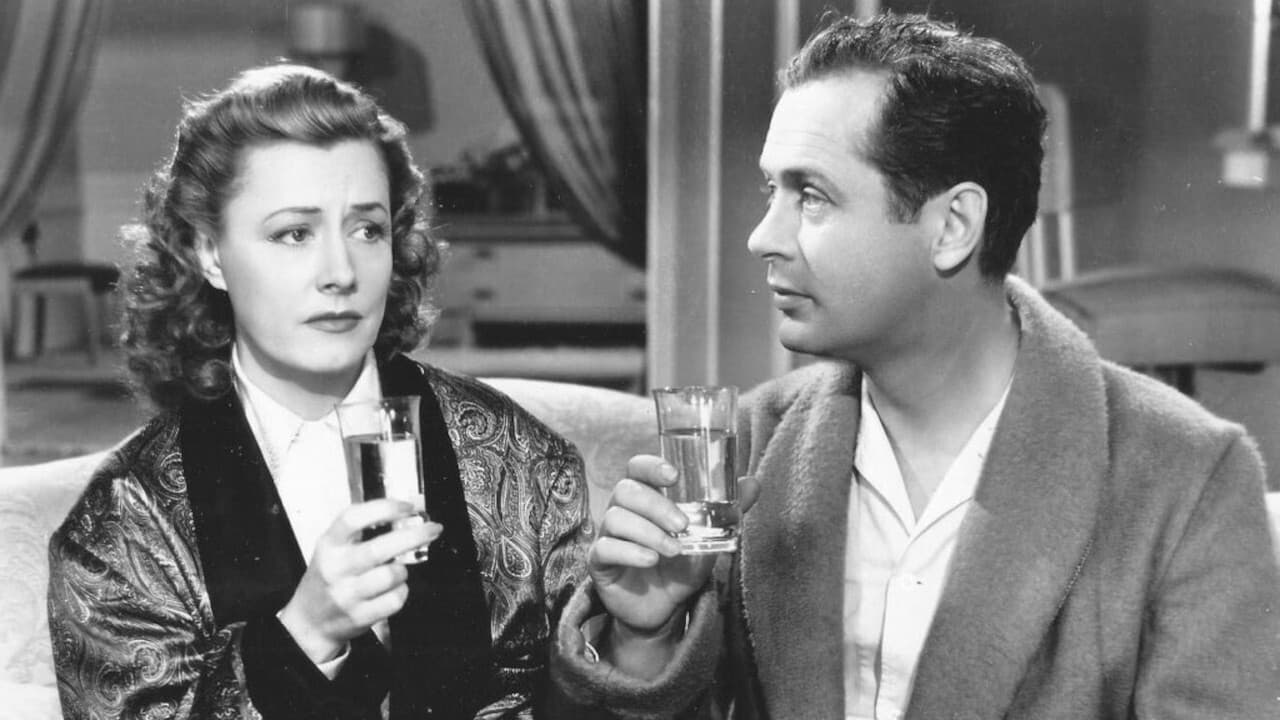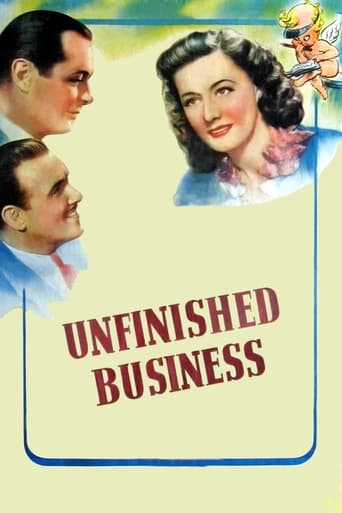

"Unfinished Business" is billed as a comedy and romance. It is that, and more. The comedy is mostly of a biting nature, set in a plot that otherwise would be a serious drama. The plot sets up early around a theme that was prevalent in the movies, at least, of the first two- thirds of the 20th century. A small town guy or gal had to leave the "sticks" for the land of golden opportunity and/or the excitement of the big city. Most often it was the big apple, New York. The story soon splits into smaller plots that overlap. The girl from the sticks meets and falls for a guy right away. He, of course, is just looking for some fun or a one-night stand. She meets another guy who happens to be the brother of her first love, although she doesn't know it at the time. He is a wealthy lush who doesn't like his brother and who, for some unknown reason, is running away from life by drowning his sorrows in a hedonistic lifestyle. But, he has a good heart, is affable and pleasant and takes the gal out one evening. They get plastered and wake up the next morning married. She then finds out he's the brother of the guy she fell for, but doesn't tell him. After some weeks of partying every night, he wants to stay home, and she still wants to live a night life that leaves her with no memories of the night before the next morning. In time, he falls in love with her. The story continues from there, and one can guess many different endings. So, the one that comes is something of a surprise and good. It wraps up the complexity of this multi-plot story at least satisfactorily. This is not the stuff around which comedies are built normally, and it's obvious why there weren't many such films made. But, with the biting humor, it is a sort of social commentary on the various escapist ideas of life – their fantasy and futility. The cast all are very good. Irene Dunne plays Nancy, showing her great diversity in manners and mood for roles. Robert Young is very good as Tommy, her husband. And Eugene Palette is superb as Elmer, Tommy's butler and nursemaid. All the others of the cast are fine. Most of the comedy is provided by Elmer and Tommy. The screenplay can't handle very well the complexity of the different subplots. It has gaping holes in places. And it has some sections of dialog that seem strange, not to belong or necessary. For instance, Tommy's experience as a baby with black cats. Nancy's romance in a one-night fling on a passenger train, and then her hurt and bitterness for many months afterward is a stretch. She's intelligent to begin with, and wary of just such encounters. We never know the cause of Tommy's wanting to escape from life by drowning himself in booze. The mood and attitude changes are sudden with Nancy and Tommy after many weeks of drinking themselves into stupors. There are missing aspects of the wealthy, such as meeting family members before marriage. The film, for length, cuts out the night flight to South Carolina and Tommy and Nancy's getting married. It jumps from their split to Tommy suddenly in Army boot camp. He goes from a lush to stopping drinking, apparently overnight. Then there are a couple of strange exchanges between Nancy and Elmer. They aren't important for the plot and seem out of place as though they were inserted just to liven up the film with some comedy. It's an interesting film, but not a comedy that provokes laughter. It's highest value may be in its look at the reality of a period of time in American culture. Many young people sought to pursue dreams of wealth, excitement, success and love with so little to go on, and while the vast majority of them never reached their dreams, those few who did often found lives that were far short of their fantasies. Here are some humorous lines from the film. For more dialog samples, see the Quotes section in this IMDb Web page of the movie. Frank, "You can't make an eagle out of a hen by changing the shape of the egg."Tommy, "Where do you come from, anyway?" Nancy, "Messina, Ohio." Tommy, "Oh, Indian country." Nancy, "You know, if you hadn't been with Mr. Duncan for such a long time, I'd fire you." Elmer, "I wouldn't mind. Give me a chance to catch up on some sleep." Nancy, "You're not my idea of a butler" Elmer, "You're not my idea." Tommy, "You aren't complaining, Elmer?" Elmer, "Why should I complain? I've had two wonderful hours sleep every night for a week." Nancy, "Well, it's all your fault. You said you were going to teach me how to live. I'm gonna learn if it kills me." Tommy, "Learning how to live is one thing. We didn't enter into a suicide pact." Tommy, "Uh, Mrs. Duncan, I'd like to present Mrs. Duncan." Nancy, "How do you do!" Sheila, "I suppose we should all congratulate each other." Tommy, "I've already done it. You three can go ahead." Nancy, shaking hands with Sheila, "Congratulations!" Sheila, "Oh, congratulations!" Nancy, shaking hands with Steve, "Congratulations!" Steve, "Congratulations!" Nancy, "Maybe we can all celebrate our anniversaries together if our husbands remember." Sheila, "They can always be prompted." Tommy, "I've been doing a lot of thinking this past year." Nancy, "Have you?" Tommy, "Yeah. The Army has a way of toughening up your muscles and softening up your pride." Nancy, "Well, you mustn't allow anything to soften your pride."
... View MoreI found this to be a very disquieting film. Not only because it seems to straddle genres between screwball comedy and bittersweet romance but because I simply can't believe Irene Dunne's character. She acts well in this film but I cannot believe that she would let herself succumb to Preston Foster's villainous charms and then carry a torch for him after what we are led to believe is a one night stand. Dunne's character is completely wrapped up in that encounter and she can't believe that the love she imparted will never be returned. She is the only one who can't see that she is just another notch on Preston Foster's belt! And all the while a new love, Robert Montgomery, is ready, willing and able but yet Dunne is oblivious to the depth of his feelings for her. Though she marries him and bears him a child, it is not until the very end of the film that they come full circle as a couple and then only after each has found their own identity--she as a chorus member in the opera and he as a soldier. On the plus side, it is refreshing to watch veteran character actors Eugene Palette and Esther Dale in small but crucial parts, the former providing much needed comic relief. Almost skipped this one entirely, only Miss Dunne's loveliness and Robert Montgomery's acerbic wit saved it.
... View MoreAny picture which brings Irene Dunne and Robert Montgomery together, with direction by Gregory La Cava has something to recommend it. Right? There is some charm and humor here but it's as if the whole project can't make up its mind and the dramatic elements flirt with dare I say it – the unhappy ending. SPOILERS: It is nice to see lovely Miss Dunne (but as a spinster?) and the worldly Mr. Montgomery toss witty and pithy observations as if they didn't care only to marry on the day they meet? It is fun to have Eugene Palette mixing in as a blunt butler, speaking his mind now and then. And it is good to know that their happiness is assured in the end, if they'd just get out of their own proud ways. But this oddly "Unfinished Business," in which they are so desperately involved, is something to tax the believability of even the most open mind. For it makes the assumption that an innocent girl from the Ohio sticks could be so emotionally impressed by a Pullman-car romance with a sleek sportsman that her subsequent marriage with the same fellow's brother would be badly jeopardized thereby. Furthermore, it assumes that the brother would be such a dolt that a term of army service and a chance to clip his fraternal rival on the jaw would clear his mind of all doubts. In brief, like many another picture, it makes a romantic plot but not much sense. Under the circumstances, the actors do well. Miss Dunne, even though she must combine the naïveté of Cinderella with the devastating wit of a Dorothy Parker, is charming; Mr. Montgomery, as the slobbering playboy is nice. And Mr. Palette, Preston Foster, Walter Catlett and several others round out a good cast. Mr. La Cava has done a lot to disguise a foolish script with glib action, but the trick doesn't quite come off. The unfinished business here lies dead in someone's typewriter.
... View MoreEvery star has a list of movies they'd rather not have made, and I would guess this movie is one of Irene Dunne's. She did a good job in it, and the plot wasn't as inprobable as many movies on the market today. But the movie is dated in many ways: Small town girl goes to big city; falls for the first smooth-talker she meets; marries somebody else on the rebound; eventually falls deeply in love with him; everybody lives happily ever-after. If Irene Dunne weren't in it, this movie would have little to commend it. But she adds luster to practically everything she ever made. This is a film worth watching because it has its comic moments. And after all - it has Irene Dunne.
... View More